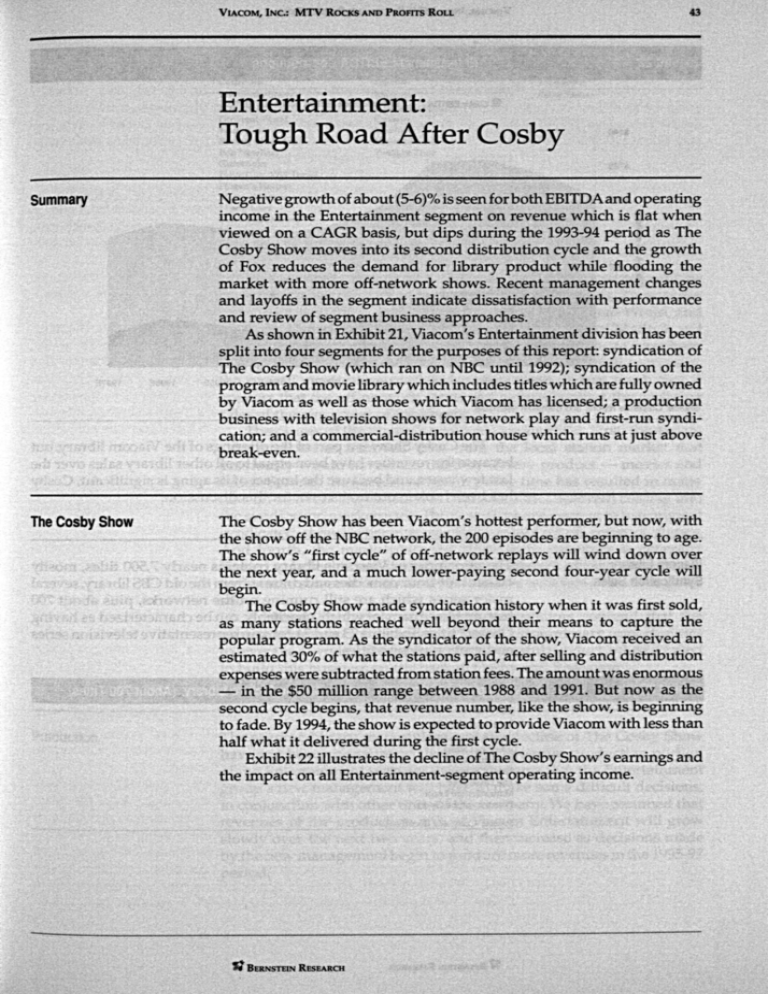Entertainment: Tough Road After Cosby
advertisement

VIACOM, I N C : MTV ROCKS AND PROFITS ROLL 43 Entertainment: Tough Road After Cosby Summary Negative growth of about (5-6)% is seen for both EBITDA and operating income in the Entertainment segment on revenue which is flat when viewed on a CAGR basis, but dips during the 1993-94 period as The Cosby Show moves into its second distribution cycle and the growth of Fox reduces the demand for library product while flooding the market with more off-network shows. Recent management changes and layoffs in the segment indicate dissatisfaction with performance and review of segment business approaches. As shown in Exhibit 21, Viacom's Entertainment division has been split into four segments for the purposes of this report: syndication of The Cosby Show (which ran on NBC until 1992); syndication of the program and movie library which includes titles which are fully owned by Viacom as well as those which Viacom has licensed; a production business with television shows for network play and first-run syndication; and a commercial-distribution house which runs at just above break-even. The Cosby Show The Cosby Show has been Viacom's hottest performer, but now, with the show off the NBC network, the 200 episodes are beginning to age. The show's "first cycle" of off-network replays will wind down over the next year, and a much lower-paying second four-year cycle will begin. The Cosby Show made syndication history when it was first sold, as many stations reached well beyond their means to capture the popular program. As the s3Tidicator of the show, Viacom received an estimated 30% of what the stations paid, after selling and distribution expenses were subtracted from station fees. The amoimt was enormous — in the $50 million range between 1988 and 1991. But now as the second cycle begins, that revenue number, like the show, is beginning to fade. By 1994, the show is expected to provide Viacom with less than half what it delivered during the first cycle. Exhibit 22 illustrates the decline of The Cosby Show's earnings and the impact on all Entertainment-segment operating income. V BERNSTEIN RESEARCH 44 VIACOM, INC.: MTV ROCKS AND PROFITS ROLL Exhibit 22 Entertainment EBITDA Contributions I Cosby EBITDA $140 • Productions EBITDA f-i Library EBITDA , $120 $100 $20 $0 1988 1989 1990 1991 1992E 1993E 1994E 1995E 1996E 1997E Source: Corporate reports and Bemstein estimates. The Cosby Show is a part of the offerings of the Viacom library, but because the revenues have been equal to all other library sales over the last few years, and because the impact of its aging is significant, Cosby has been broken out on its own for this discussion. Viacom Library Syndication Sales The remainder of Viacom's library contains nearly 7,500 titles, mostly classic half-hour comedies and dramas from the old CBS library, several major series which are still running on the networks, plus about 700 feature films many of which, charitably, can be characterized as having "lesser" titles. Exhibits 23 and 24 contain representative television series and motion picture titles. Exhibit 23 Sample Films from the Viacom Motion Picture Library (About 700 Titles) The Bees Superman III & IV Lady Frankenstein American Ninja Exterminator II Texas Chainsaw Massacre U The Deerslayer Maneaters are Loose Phantom of the Opera Source: Company documents. 9 BERNSTEIN RESEARCH 45 VIACOM, INC.: MTV ROCKS AND PROHTS ROLL Sample TV Shows in the Viacom Syndication Library Comedies The Cosby Show Dramas Matlock Roseanne Different World Andy Griffith Beverly Hillbillies Bob Newhart Gunsmoke Have Gun, Will Travel Hogan's Heroes Honeymooners I Love Lucy Mary Tyler Moore My Three Sons Jake & the Fatman TV Movies Perry Mason Cannon Rawhide Hawaii Five-O T^vilight Zone Source; Company documents. Viacom holds distribution rights to solid shows which will be completing their network runs over the next several years. These series include licenses for distribution of Roseanne, A Different World, and the Perry Mason made-for-TV movies, and ownership of Matlock and Jake and the Fatman. While the company's hope seems to have been that growth of these shows would offset declines in Cosby revenues, the overall S5mdication marketplace has weakened so much that it appears that the off-network series will be barely offset the declirung sales of the remainder of the library. The causes of the library's problems are fourfold. First, the expansion by Fox has removed time from the local station market that previously would have been filled by library product — movies and series. Second, the success of Fox in prime time has resulted in many new off-network shows (such as Married with Children) coming into the syndication marketplace. Third, stations are electing to use original syndicated shows whenever possible instead of off-network shows. And fourth, the marketplace for off-network comedies is generally limited to independent stations, as most network affiliates have come to prefer to surround their local news shows with tabloid, talk or game shows. Additionally, people at \^acom's competitors contend that the company blew one of the industry's most extraordinary opportunities to leverage a syndication business on successful product, when it failed to build this business on the back of Cosby and Roseanne. Production The sagging library marketplace and the decline of The Cosby Show have put heavy pressure on the original program production portion of the Entertainment segment. It is in this area that the Entertainment group's new management will have to make some difficult decisioris, in conjvmction with other units of the company. We have assumed that revenues of the production arm of Viacom Entertainment will grow slowly over the next two years, and then increase as decisions made by the new management begin to produce more revenues in the 1995-97 period. Sf BERNSTEIN RESEARCH 46 VIACOM, INC.: MTV ROCKS AND PROFITS ROLL The production group makes the successful network series Matlock and Jake and the Fatman, as well as two Fox series (Flying Blind and Key West). Matlock — now on ABC — is in its seventh, and probably last, season. Jake and the Fatman has over 100 episodes completed. As a result, both are solid syndication properties, but, because they are hour-long dramas, there is more demand for cable play than local station usage. Of much greater challenge is the first-run-syndication production business. Here Viacom, in partnership with Chris Craft, is producing The Montel Williams Show. The young, shaved-headed host runs a talk show that is frequently aired by television stations in the mornings. Chris Craft owns half of the show, and provides major market distribution on its own stations. So far the new show has lost about $5 million for the partners, and while it appears the show should be about ready to turn the comer, a new entry may cause new problems. Over at King World, syndication impresario Roger King (Oprah!, etc.) has annoxmced his own show which could go directly at the Williams slots, or, if aired across from Williams, for his audience. The new King show features Les Brown. Brown is a best-selling author and very successful self-help-type-of-guy who specializes in motivational speaking. King World's packaging clout could result in heavy pressure on Montel in the mornings, and, if network affiliated statiorxs are forced to move it to afternoons across from Oprah!, then it would be a sure loser. Such pressure on Montel would force Viacom and Chris Craft into one of two decisions—either cancel the show or invest heavily, perhaps doubling the losses before the show turns the comer. The principle cash need would probably be in advertising and promotion (A&P). King World is likely to invest some $10 million per year in A&P alone for the Les Brown Show. This amount appears to be more than double what Viacom/Tribune spends on the promotion of Montel. The difficulty of the sjmdicated talk-show business and the uncertainty of production for first airing on networks could result in Viacom shifting entertainment resources into line extensions of its popular cable brand names, and into network productions which leverage its cable names. The first evidence of this thinking for the company is the syndication of a weekly VH-1 "Top 21 Countdown" show for broadcast stations on a barter deal in which commercials are split 50-50 between national and local spots. There may be another half dozen potential shows between various elements of the cable networks which lend themselves to low-cost, high-visibility syndicated production. As Viacom is reorganizing its Entertainment segment management from top to bottom, there is one interesting insight into the solid corporate management approach that Viacom appears to be taking. It has formed One World Entertainment which is a new barter-advertising sales group selling time on both the cable networks and the syndicated shows. What makes this unit unique is that it has been organized under the MTV management to sell all syndicated shows the company produces in all divisions — from MTV to Montel. It appears the decision M BERNSTEIN RESEARCH 47 VIACOM, INC.: MTV ROCKS AND PROHTS ROLL was made that the MTV group could do a better job of selling advertising than the syndication unit, so the entire responsibility was handed to MTV for product produced by both cable and syndication, instead of allowing different competing sales groups to evolve (as they have at the broadcast networks) or taking the traditional approach which would have had the less-effective syndication unit sell advertisements for the MTV barter-syndication product. Interactive Business Viacom recently announced that it was forming a new business to develop interactive software based on some of its program properties. Software developed by this unit could be tested and used on the Viacom cable systems, as well as on other cable systems and on personal computers. One of the first products that we expect to see is a Liquid Television "experience"—game may be too precise—based on the too-too bizarre MTV show of the same name. It is impossible to describe the psychoanimi-sexual allure that Liquid Television may hold for the new interactive marketplace. (However, we suggest that readers interested in the creative potential of Viacom's interactive activities catch the Liquid TV show on MTV.) We have not included estimates for the new interactive business in this report because, at this point, both the direction and potential of the business are unclear. Exhibit 25 Entertainment Scenarios ($ million) BaseCaae Net Income Recurring 1994E 1995E 1996E 1997E $0.17 $0.19 $0.20 $0.17 Eamings Before Income Taxes 1994E 1995E 19%E 1997E $43 $48 $51 $43 Optimistic Scenario Library Revenues up 5% Production Revenues up 5% Pessimistic Scenario Production Revenues off 5% Library Revenues off 5% $0.02 0.03 $0.05 0.06 $0.07 0.10 $0.10 0.14 $(0.03) $(0.06) $(0.09) $(0.11) (0.02) (0.05) (0.07) (0.08) $5 6 $10 12 $15 20 $19 28 $(5) (5) $(12) (9) $(18) (13) $(23) (16) Source; Bernstein estimates. Risks To Syndication Estimates The syndication and production businesses are filled with risks. On the down side, 5 percentage point decay in the production and syndication marketplace could drive operating income of the Entertainment unit down to breakeven. On the up side, library and production revenue growth of 5% above the base could double the operating income. N BERNSTEIN RESEARCH







